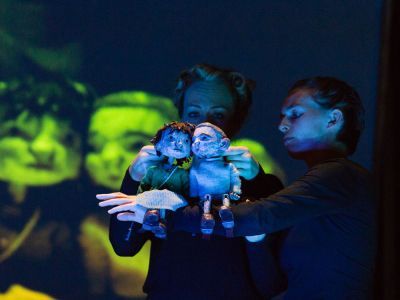Guildhall questions: Matthew Kaner answers

Hansel and Gretel (A nightmare in eight scenes) is a reimagining of the famous tale, with specially commissioned poetry and chamber music, and puppetry and animations, all projected live on to a large screen.
Created and produced by Goldfield Productions, Hansel and Gretel appear as table-top puppets struggling in an unforgiving world of wooden forests, desolate villages and a fearsome predator, creating a sinister fable for our times, with music by Guildhall professor Matthew Kaner.
Hansel and Gretel (A nightmare in eight scenes) takes places on Friday 12 October in the Milton Court Concert Hall
We caught up with Matthew Kaner to find out more about the process behind creating Hansel and Gretel.
Tell us a bit more about this reimagining of Hansel and Gretel – how did it all come about?
That's quite a long story! The first seeds of the project grew from a picture book made by our artistic director, Clive Hicks-Jenkins, which retold the original fairy tale in a beautiful sequence of images without any text. Clive and I were then put in touch by our mutual and multi-talented friend Kate Romano who produced the finished show through her company, Goldfield Productions, and plays the clarinet on stage. Simon Armitage came on board as our writer via his collaboration with Clive on another project.
What was the process behind composing music to go with Simon Armitage’s poetry and the on-stage puppetry and video?
Clive and I had to work on our contributions for the project simultaneously, and therefore shared as much we could via email as we developed the work. (It's difficult to share music that hasn’t been played yet!)
Simon's remarkable poetry, which was written first, was really what bound those two strands (music and visuals) together as we worked. We spent many hours reading through the poetry together, discussing it, coming to terms with its implications, moods and characters, to try to achieve a compelling shared interpretation.
Some of the early workshopping was done here at Guildhall with Production Arts students – what was that like?
That's right. We agreed early on that we'd use this workshopping period at Guildhall to test-drive three scenes of the final eight. It was a challenging week, as it was the first time anyone had heard the music live, and a lot of elements (puppetry, animations, live camera) had to come together very quickly. The Production Arts students were a very slick and supportive presence throughout the process, and a delight to work with.
The production has been on a bit of a tour – what’s the response been like so far? And what can London audiences expect on the night?
The response has generally been excellent. We received some particularly lovely feedback and reviews from the premiere at Cheltenham in July. The audience seemed to grasp our renewed vision for the fairytale and to enjoy it.
Without giving too much away, London audiences can expect quite a dark retelling of the original, with strong contemporary resonances and unsettling moments, along with the expected high doses of sugar, childhood sounds (including toy pianos), breadcrumbs and of course, a witch.
What are you most looking forward to about the performance in Milton Court?
I remember when the hall opened in Milton Court, and felt amazed by its beautiful acoustics; it's one of the few venues in London where it doesn't really matter where you sit. The sound travels beautifully to all corners of the hall. It'll be lovely to see and hear Hansel and Gretel in that space, and to have a piece performed at my own home institution!
As a professor of composition here at Guildhall, what do you most enjoy about working with young composers?
I think I've learned as much from teaching young composers as I did as a student! The students at Guildhall keep me forever on my toes, introduce me to new music and continually challenge me to think differently from each week to the next.
Who have been some of your biggest inspirations in your career?
There have been so many. Julian Anderson (a professor here) taught me for my master’s degree and really gave me the confidence and technical foundations I needed at the time to begin composing professionally.
I met many of my heroes a little later during various professional development schemes (Wolfgang Rihm, Oliver Knussen, George Benjamin, Colin Matthews), all of whom really encouraged and taught me all sorts of different things: artistic, musical and technical advice plus a few practical, career-oriented tips as well. If I could go back a few years I'd have loved to have met Steve Martland, Toru Takemitsu and Henri Dutilleux; three very different composers, but all of whom inspired me a great deal at various pivotal moments in my development.
What are your passions outside of composing?
I'm a bit of a DIY enthusiast, so anyone who knows me well will have seen some of my handiwork at home... I love being outdoors and have been on some epic cycle rides over the years.
If you had one piece of advice for young composers today, what would it be?
Work as hard as you can and keep challenging yourself. Listen to as much music as possible, and don't get too hooked on any one thing. Keep discovering, and be open to other art forms and ways of thinking. It's also important to keep a sense of perspective and find moments when you don't have to take yourself too seriously. (We composers can be a very earnest bunch at times...)
Hansel and Gretel (A nightmare in eight scenes) takes places on Friday 12 October in the Milton Court Concert Hall. Tickets are available via Barbican Box Office. Book your tickets now.